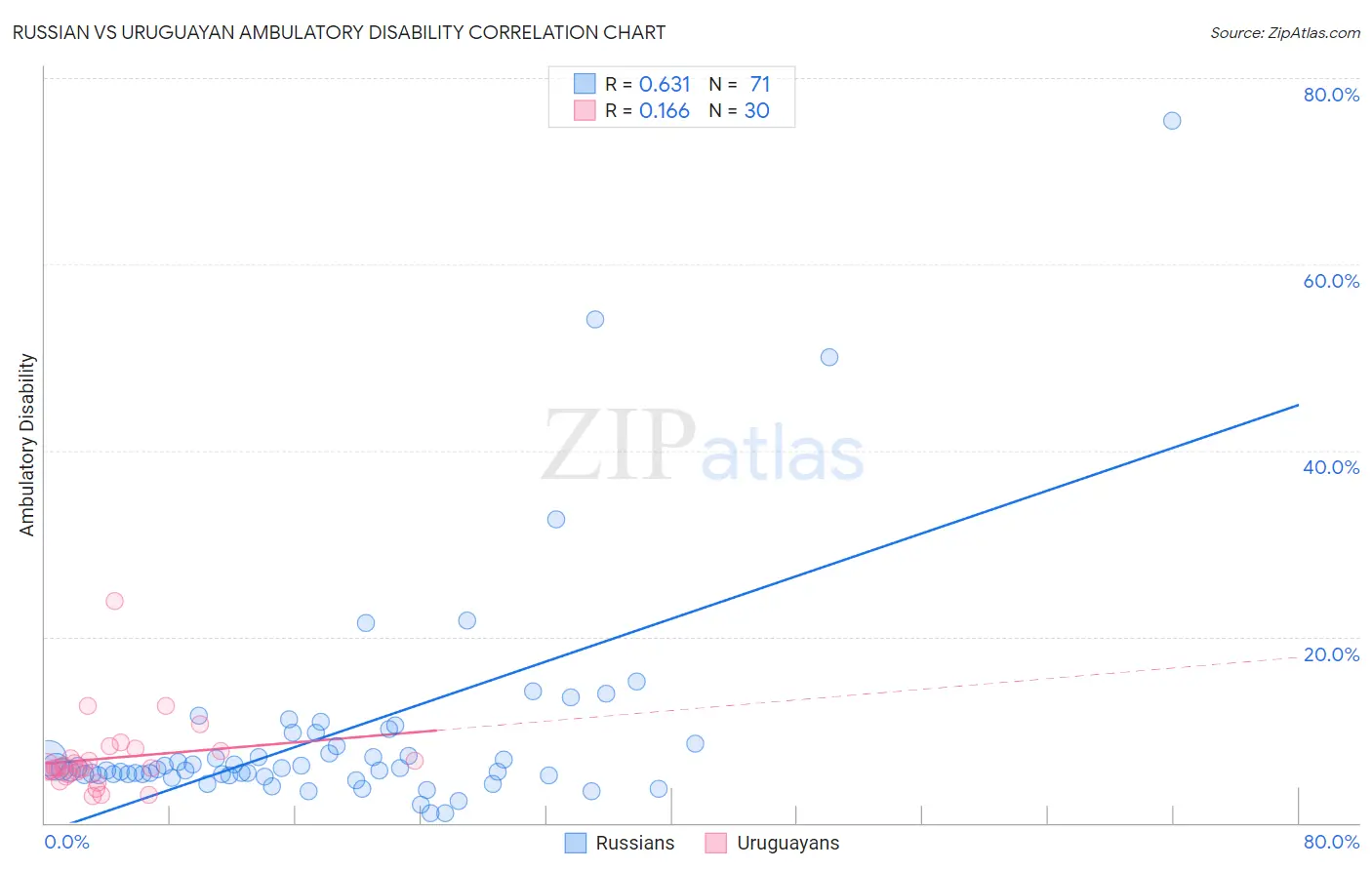Russian vs Uruguayan Ambulatory Disability
COMPARE
Russian
Uruguayan
Ambulatory Disability
Ambulatory Disability Comparison
Russians
Uruguayans
5.9%
AMBULATORY DISABILITY
93.4/ 100
METRIC RATING
118th/ 347
METRIC RANK
5.8%
AMBULATORY DISABILITY
97.2/ 100
METRIC RATING
107th/ 347
METRIC RANK
Russian vs Uruguayan Ambulatory Disability Correlation Chart
The statistical analysis conducted on geographies consisting of 511,917,360 people shows a significant positive correlation between the proportion of Russians and percentage of population with ambulatory disability in the United States with a correlation coefficient (R) of 0.631 and weighted average of 5.9%. Similarly, the statistical analysis conducted on geographies consisting of 144,780,979 people shows a poor positive correlation between the proportion of Uruguayans and percentage of population with ambulatory disability in the United States with a correlation coefficient (R) of 0.166 and weighted average of 5.8%, a difference of 1.2%.

Ambulatory Disability Correlation Summary
| Measurement | Russian | Uruguayan |
| Minimum | 1.0% | 2.9% |
| Maximum | 75.4% | 23.8% |
| Range | 74.4% | 20.9% |
| Mean | 9.5% | 6.9% |
| Median | 5.8% | 5.9% |
| Interquartile 25% (IQ1) | 5.2% | 5.3% |
| Interquartile 75% (IQ3) | 8.5% | 7.7% |
| Interquartile Range (IQR) | 3.3% | 2.4% |
| Standard Deviation (Sample) | 11.9% | 4.0% |
| Standard Deviation (Population) | 11.9% | 3.9% |
Demographics Similar to Russians and Uruguayans by Ambulatory Disability
In terms of ambulatory disability, the demographic groups most similar to Russians are Immigrants from South Eastern Asia (5.9%, a difference of 0.040%), Norwegian (5.9%, a difference of 0.080%), Estonian (5.9%, a difference of 0.11%), Costa Rican (5.9%, a difference of 0.18%), and Icelander (5.9%, a difference of 0.18%). Similarly, the demographic groups most similar to Uruguayans are Colombian (5.8%, a difference of 0.010%), Immigrants from Netherlands (5.8%, a difference of 0.030%), Immigrants from Morocco (5.8%, a difference of 0.050%), Immigrants from Czechoslovakia (5.8%, a difference of 0.12%), and Immigrants from Colombia (5.8%, a difference of 0.21%).
| Demographics | Rating | Rank | Ambulatory Disability |
| Immigrants | Kenya | 97.8 /100 | #102 | Exceptional 5.8% |
| Immigrants | Romania | 97.7 /100 | #103 | Exceptional 5.8% |
| New Zealanders | 97.6 /100 | #104 | Exceptional 5.8% |
| Immigrants | Czechoslovakia | 97.4 /100 | #105 | Exceptional 5.8% |
| Immigrants | Morocco | 97.3 /100 | #106 | Exceptional 5.8% |
| Uruguayans | 97.2 /100 | #107 | Exceptional 5.8% |
| Colombians | 97.2 /100 | #108 | Exceptional 5.8% |
| Immigrants | Netherlands | 97.1 /100 | #109 | Exceptional 5.8% |
| Immigrants | Colombia | 96.7 /100 | #110 | Exceptional 5.8% |
| Danes | 96.6 /100 | #111 | Exceptional 5.8% |
| South Africans | 96.3 /100 | #112 | Exceptional 5.9% |
| Immigrants | Uruguay | 95.6 /100 | #113 | Exceptional 5.9% |
| Immigrants | Poland | 95.4 /100 | #114 | Exceptional 5.9% |
| South American Indians | 94.8 /100 | #115 | Exceptional 5.9% |
| Immigrants | Africa | 94.7 /100 | #116 | Exceptional 5.9% |
| Immigrants | South Eastern Asia | 93.6 /100 | #117 | Exceptional 5.9% |
| Russians | 93.4 /100 | #118 | Exceptional 5.9% |
| Norwegians | 93.1 /100 | #119 | Exceptional 5.9% |
| Estonians | 92.9 /100 | #120 | Exceptional 5.9% |
| Costa Ricans | 92.6 /100 | #121 | Exceptional 5.9% |
| Icelanders | 92.6 /100 | #122 | Exceptional 5.9% |